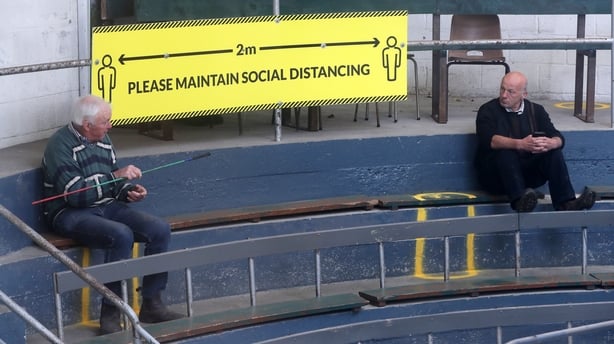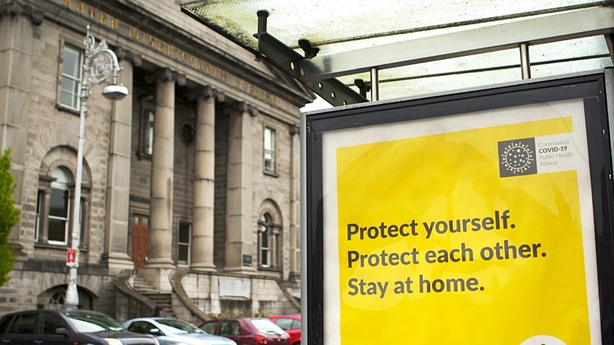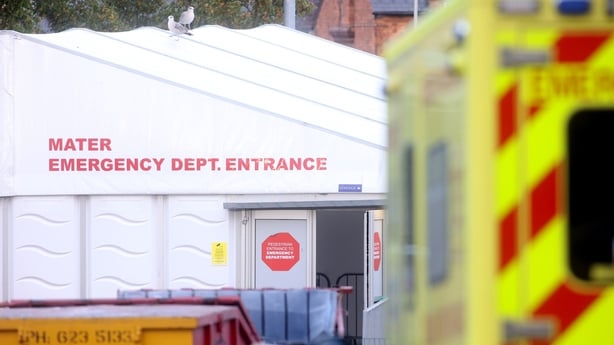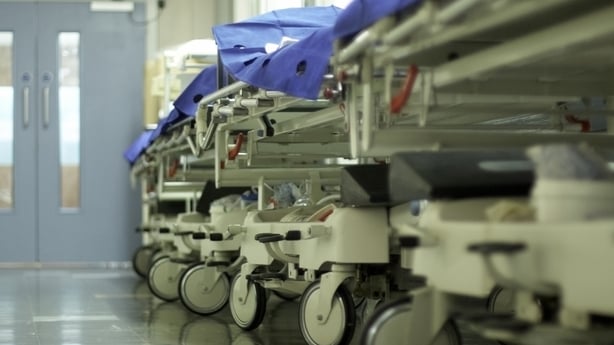Five years since the first cases of Covid-19 here, and it feels like that time and place was another country.
We no longer hear regular terms such as social distancing, self-isolation, community transmission, virus mitigation and suppression, the R number, or the EU Digital Covid Certificate, for travel abroad.
We also had the National Public Health Emergency Team, and of course the dreaded lockdowns.
There were effectively four lockdowns (or period of severe restrictions) which started in March 2020, October 2020, December 2020 and December 2021.
Most restrictions were lifted for good in February 2022.
Ireland has returned to relative normality, however there are many people still suffering from Long Covid.
There are also many families still grieving the loss of loved ones to the disease.
Remote working continues to a degree, a byproduct of the pandemic.
Ireland saw 1.753 million confirmed cases of Covid-19, according to the Health Protection Surveillance Centre.

It has also reported over 10,000 deaths which continue to be a source of great individual sadness and loss for families. On average, each year, there are around 35,000 deaths here due to all causes.
An independent, non-statutory, evaluation of the State's response to the pandemic, led by Professor Anne Scott, has begun and is expected to report to Government in around 12-18 months.
First cases emerge
The exact origins of coronavirus are not certain.
However the first cases emerged in China, apparently from a market in Wuhan in December 2019. Other unconfirmed reports suggest it may have leaked from China's Wuhan Institute of Virology.
This was the 'Wild Type' Wuhan strain and then came a series of Variants of Concern (VoC).
The first case of coronavirus in Ireland (later re-named Covid-19) was confirmed on 29 February 2020. It involved a man who had returned from a part of Italy where there was a major outbreak.
The country had watched on in horror at the harrowing scenes in hospitals in northern Italy, where its well-funded health system could not cope and there were not enough beds.
We saw severely ill patients dying outside of intensive care units.
So, it was only a matter of time before Ireland had its first case.
The first death here was reported on 11 March 2020 and this involved an older woman.
That same day, the World Health Organization declared a global pandemic.
"Research shows that around 14-15,000 deaths were avoided here due to the successful vaccination programme."
NPHET, led by Chief Medical Officer Dr Tony Holohan, was established in early 2020 and gave regular evening updates on cases, deaths, transmission trends and projections.
It advised the Minister for Health and the Government on the actions that it believed were needed and many of these proved very controversial.

Severe restrictions were imposed on society to try and contain and reduce the spread of the virus.
Generally, we lived in each other’s protection and found common cause to face the unknown. But as time went on, cracks emerged in the consensus about how to deal with the threat.
The first vaccinations here began in December 2020 and to date over 14.5 million vaccines have been administered here. Booster vaccines continue to be made available, at certain times of the year.
According to Dr Colm Henry, Chief Clinical Officer at the HSE, research shows that around 14,000-15,000 deaths were avoided here due to the successful vaccination programme. This is based on a 2024 research paper involving the HSE's Health Protection Surveillance Centre, the European Centre for Disease Control and the Italian National Institute of Health.
The WHO declared an end to the public health emergency on 5 May 2023 but this does not mean the pandemic itself is over.
Long Covid
For some people who have contracted Covid-19, they may go on to have a range of symptoms for weeks or months, even years, after the infection has passed.
This is called Long Covid.
A survey in a HSE report published in December estimated that 16% of the population sampled had experienced Long Covid.
This was largely based on self-reported cases by people who claimed they had Long Covid.

Among those still ill with Long Covid symptoms, the five most reported symptoms were fatigue, cognitive issues (problems affecting thinking, learning, memory, planning, concentration, and decision-making), joint or muscle pain, sleep disturbances and breathlessness.
Some people report being unable to taste or smell after being infected.
The study surveyed adults who had tested positive for Covid-19 on a PCR test to assess their health following their infection.
Over 49,000 people with a previously confirmed diagnosis of Covid-19 between March 2020 and January 2022 and who lived in the Dublin and midlands region were invited to complete the survey for the HSE during summer 2023.
From the survey, 2,338 reported ever having Long Covid symptoms. Of these, 424 reported that they were clinically diagnosed by a doctor.
Watch: Lydia Fischer Dooley has been trying to cope with Long Covid for several years
The campaign group, Long Covid Advocacy Ireland says people affected can have difficulty accessing healthcare support.
It describes Long Covid as a public health crisis.
The group says hundreds of thousands of people in Ireland have been disabled by the virus, impacting their ability to work, study, socialise, and care for themselves or their families.
The HSE has six Long Covid clinics, at Cork University Hospital, University Hospital Limerick, Galway University Hospital, Beaumont Hospital, St Vincent's University Hospital and St James's Hospital. The opening hours vary by clinic.

Referrals are made through the GP or a patient's consultant.
The HSE said that it has started the process of revising its interim Long Covid Model of Care, published in September 2021.
It said that this review will involve patient representatives.
It said there is no single treatment for Long Covid, but patients can do things to manage their symptoms.
Variants of concern
The coronavirus that emerged from China in December 2019 was named SARS-CoV-2 virus.
Like many other countries, Ireland was later affected by several waves of variants of concern.
According to WHO there were five variants of concern.
But not all these affected Ireland with the same impact, some were much more severe.
The first was the Alpha variant, which had a big impact after it emerged in December 2020.
"It took time, but a lasting legacy of the pandemic is a rise in ICU bed numbers."
The Delta variant had a big impact from Summer of 2021 and Omicron had a significant impact when it emerged towards the end of that year too.
It has been the dominant variant since, with various sub-strains.
During the pandemic, the highest number of ICU admissions and deaths were seen in 2021.
The highest number of cases and hospitalisations were seen 2022, according to the HPSC data.
While new variants have emerged since, there have been no new variants of concern (VOC) in recent years.
Around 130 cases of Covid-19 are still seen each week, but widespread HSE testing ended a few years ago and so these figures would be an underestimate.
Wastewater testing continues to get a sense of the scale of virus in the country and the strains in circulation.
Admissions to ICU continue and unfortunately there continue to be deaths reported.
Seasonal surges are still expected which can add to pressure on the health system.
However, in recent months, it was a surge in influenza cases and the Respiratory Syncytial Virus that really challenged the health system.
Lack of ICU beds
At the start and during the pandemic, serious questions were asked of the HSE about the preparedness of the hospital system for a flood of cases. The public had watched the scenes from northern Italy where hospitals were overflowing with very ill patients and there were many deaths.
Bed capacity was a big issue here and concerns over a lack of Intensive Care beds, as well as acute beds for patients.

Dr Colm Henry says even well-developed health systems like Ireland had proved "remarkably fragile", especially during the first years of the pandemic.
We did not have the surge capacity of acute beds or ICU beds needed and the public health surveillance system was under resourced.
"There were successes here too, with Ireland achieving the highest rate of primary Covid-19 vaccination across Europe."
During the start of the pandemic, hospitals had around 255 ICU beds and that increased to around 280 by the end of 2020.
It took time, but a lasting legacy of the pandemic is a rise in ICU bed numbers.
The HSE said that at the end of December last, there were 340 funded ICU beds in the system and the aim is to bring this up to 352 by the end of this year.
The number of open ICU beds can vary on any given day and increases or decreases can be down to staffing issues.
ICU experts have said that Ireland needs up to 600 critical care beds to service the population.

Excess deaths
There has been no definitive study of the whole pandemic period yet looking at excess deaths in Ireland.
Excess deaths refer to the number of deaths from all causes during a period of time, above what would normally be expected.
The Department of Health does not produce estimates of excess mortality.
Excess mortality has been observed during periods when influenza viruses circulated at high levels in Ireland, and during certain periods of the Covid-19 pandemic.
Two studies were published last year.
The Department of Health said Ireland had no excess deaths during the core pandemic years of 2020-2022, citing a Working Paper from the OECD. That study took into account population size and demographics.
However, a Society of Actuaries report said that there were around 1,100 excess deaths during the first two years of the pandemic. It concluded that restrictions were likely to have been a significant factor in keeping excess deaths lower.
The particular period of excess deaths of March/April 2020 and January/February 2021 are attributable to Covid-19.
Lessons from the pandemic
There are many questions people have about how Ireland responded to the pandemic.
The country had to respond at speed and inevitably that meant some mistakes will happen.
The Government Evaluation may offer answers to some of these issues.
A major issue is the response and support for nursing homes and elderly residents during the early stages of the virus outbreak here.
"We were trying to use a flu solution to try and deal with a Covid-19 problem which was not so good."
Figures show there were 3,184 deaths in nursing homes, plus 2,650 deaths in residential institutions.
Dr Henry says the model of care in residential institutions, like nursing homes, is not fit for a pandemic and it is best, where possible, to have people at home.
Questions have also been raised about the power of the National Public Health Emergency Team (now defunct) and its relationship with government and what independent oversight and analysis of the NPHET analysis and recommendations occurred.
People ask were all of the lockdowns and the extent of the various lockdowns necessary and were some of the restrictions on public freedoms excessive?
Watch: Your memories of Thursday 12 March 2020
Several countries did not impose severe lockdowns affecting the movement of people.
These included Iceland, Sweden, Uruguay and Taiwan.
There were successes here too, with Ireland achieving the highest rate of primary Covid-19 vaccination across Europe.
The answers to the many questions about how we handled Covid-19 here are essential if Ireland is to better manage the next pandemic, whenever it comes.
Experts were expecting another flu global pandemic
Professor Sam McConkey, Consultant Physician in Infectious Diseases at the RCSI, said that before Covid-19, many experts were expecting another flu global pandemic but the problem with coronavirus was that it was substantially different.
"We were trying to use a flu solution to try and deal with a Covid-19 problem which was not so good," he said.
Prof McConkey said that by stopping social interaction and using lockdowns, it was possible to substantially keep coronavirus at bay very successfully, which is much harder to do as a long-term strategy with flu.

He said the health system really struggled but hospitals never ran out of oxygen, which was the main therapy for people who were quite ill with double pneumonia or pneumonitis.
He believes that one of big improvements arising from Covid-19 is that the public health specialist system for tracking and tracing has been substantially strengthened over the last five years.
Prof McConkey believed that Ireland was correct to be a step earlier in closing down, and using social distancing, unlike our neighbours and some other countries, and that made a big difference.
It resulted in much less excess deaths than Britain, or the US or many other European countries, he says.
Prof McConkey says it is hard to predict what the next pandemic will be, it could be a different virus, diarrhoea, a bacterium, a toxin, or something in the water.
He has called for a lot more contingency planning.
One of the most dramatic lessons from Covid-19, is how the world can change in a short space of time, and everything we have known as certain, no longer is.
None of us want to experience those darkest of days again, but we must be prepared.







